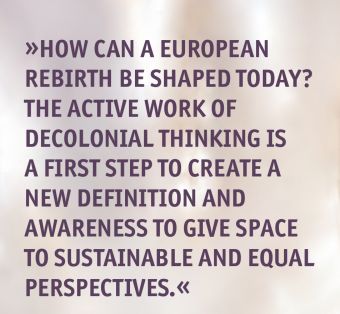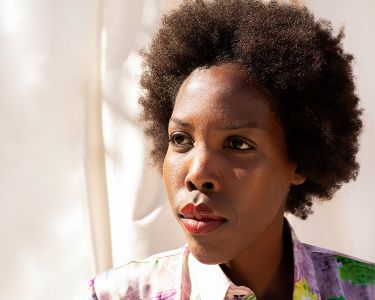
Decolonial Thinking vs. The White Savior Industrial Complex (a Podcast)
Founder of Fashion Africa Now, interdisciplinary fashion curator,
creative producer & African fashion advocate

Decolonial Thinking vs. The White Savior Industrial Complex
Colonialism is over, but the colonial continuities are still present. Colonial reappraisal is still in its infancy and, following the Black Lives Matter movement, is increasingly calling for clarification. In the cultural landscape, there is an increasing presence of the topic, but the media and textile and clothing industry still show restraint. In the fashion and design scene, approaches with a decolonial orientation have developed in recent years that critically question the fashion and design system. A booming fashion scene in Africa and its diaspora is gaining more and more international attention, breaking stereotypes, doing away with clichés and reclaiming narratives. What is the role of African fashion and design aesthetics in decolonisation? In an increasingly fast-paced world where tradition meets modernity and innovation is unstoppable, a new interplay is beginning.
How can a European rebirth be shaped today? The active work of decolonial thinking is a first step to create a new definition and awareness to give space to sustainable and equal perspectives. One approach is deconstruction.
The values and history of design are taught through a Eurocentric canon, accepting work predominantly by European and American male designers, which forms the basis of what is considered „good“ or „bad“. This authority has the effect of undermining the work of non-Western cultures and people from the Global South so that, for example, Ghanaian textiles are classified as craft rather than design. Classifying traditional craft as something other than modern design deems the history and practice of design of many cultures inferior. We should strive to remove the conflation of craft and design in order to recognise all culturally important forms of making.
Redefining old ways of thinking
It is necessary to break down and redefine old ways of thinking. That is why we are reclaiming the narrative: A new generation of designers of African origin are rethinking contemporary „African fashion“. A self-confident self-image and an aesthetic from an African perspective is presented—beyond the (neo)colonially influenced thought patterns and beauty norms. This is the beginning of „Deconstruct Fashion“. That means the breaking open and reinterpretation of fashion. A new confrontation, historical and contemporary, guided by BIPoC (Black, indigenous and people of colour) perspectives. It is important to understand the origin of African indigenous fashion and the traditional aspects in order to interpret it correctly. Due to its universalist thinking, the previous design rhetoric excludes and ignores alternative productions of knowledge.
Actively and critically engaging with the history of colonialism will open our eyes to how power structures have shaped contemporary society and how they dominate our understanding of design and aesthetics. The realisation that capitalism is „an instrument of colonisation“ and therefore almost impossible to truly decolonise in Western society.
Beatrace Angut Lorika Oola
Founder of Fashion Africa Now, interdisciplinary fashion curator, creative producer & African fashion advocate
Beatrace Angut Oola has spearheaded the conversation around inclusivity, curated exhibitions, for example „Connecting Afro Futures. Fashion x Hair x Design“ together with Cornelia Lund and Claudia Banz (Kunstgewerbemuseum Berlin, 2019), has realised fashion shows, initiated POP UP formats, moderated talks in Germany and worked on knowledge exchange projects in African countries and has also championed best in class practitioners in the diaspora. In 2012, she founded the first high-end fashion platform for designers of African origin (Africa Fashion Day Berlin) and a creative agency (APYA) in Germany; this was followed in 2016 by (Fashion Africa Now), an online networking and information platform, serving as a bridge for African creatives to Germany. Last year was the birth of the Fashion Africa Now podcast, which additionally offers an exchange on the social perception in the global north of fashion from Africa and the diaspora. She has also been a guest lecturer at the Hochschule für Künste in Bremen since October 2020. Furthermore, she is one of the global pioneers of the African fashion movement and stands for inclusion, representation and diversity in the fashion industry.

